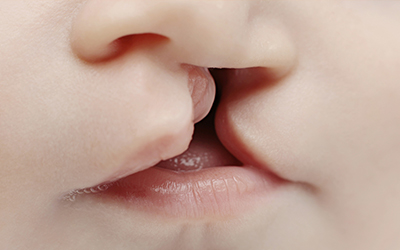
Cleft lips and cleft palates are defects of the lip and mouth that occur early in utero, preventing the roof of the mouth and the sides of the lips from fusing correctly. Here in the U.S., around 6,800 children are born with cleft palates, cleft lips, or both every year. The most common problem associated with these defects is attempting to feed your baby.
- Cleft Lip – Cleft lips occur when the lips don't completely form during development. The cleft's degree can vary from mild (a slight notch in the lip) to severe (a large opening from the lip extending through the nose).
- Cleft Palate – Cleft palates occur when the roof of the mouth doesn't fuse all the way, creating a large opening that can extend into the nasal cavity. These clefts can develop on either side of the palate and extend from the front of the mouth to the throat.
Complications Associated with Cleft Lips & Palates
Cleft lips and palates can cause problems like:
- Feeding problems – Problems with feeding occur more with cleft palates than cleft lips. Your child may not be able to latch correctly since the roof of the mouth is not entirely formed.
- Dental problems – Cleft lips and palates can cause several dental issues. The teeth may not grow in correctly, and a cleft lip or palate can affect the alveolar ridge (the upper bone and gums that contain the teeth). Teeth may be incorrectly shaped, in the wrong position, or missing entirely. For these reasons, orthodontic braces are often necessary.
- Language and speech delays – The opening in the roof of the mouth or the lip can make it difficult for children to use the muscles associated with speech, causing a lisp or a delay in speech.
- Ear infections and hearing loss – Ear infections are common in those with cleft lips or palates due to a dysfunction of the tube that connects the middle ear and the throat. If your child's cleft extends to the throat, they may experience chronic ear infections or hearing loss.
Kids with cleft lips or palates need a team of healthcare providers in their corner. Your child may need to see a pediatric dentist, a maxillofacial surgeon, and an orthodontist for dental needs.
Posted on Oct 26, 2020
Image Credit:
